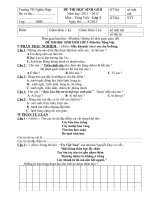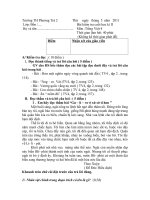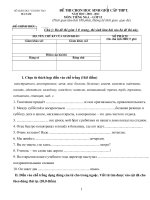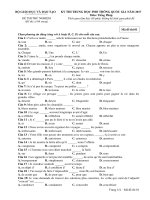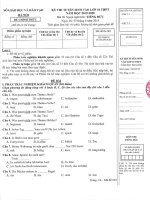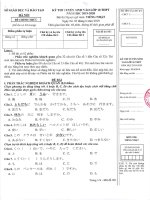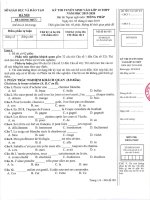ĐỀ THI THỬ MÔN TIẾNG ANH KỲ THI TRUNG HỌC PHỔ THÔNG QUỐC GIA (ĐỀ SỐ 20)
Bạn đang xem bản rút gọn của tài liệu. Xem và tải ngay bản đầy đủ của tài liệu tại đây (264.92 KB, 11 trang )
HUYCOMF’S
KỲ THI TRUNG HỌC PHỔ THÔNG QUỐC GIA NĂM 2018
ĐỀ TỰ LÀM SỐ 20
Bài thi: NGOẠI NGỮ; Môn thi: TIẾNG ANH
(Đề thi có 04 trang)
Thời gian làm bài: 60 phút, không kể thời gian phát đề
Họ, tên thí sinh: .........................................................................
Số báo danh: .............................................................................
Mark the letter A, B, C, or D to indicate the word whose underlined part differs from the
other three in pronunciation in each of the following questions.
1. license
libel
liberate
liable
2. hacked
naked
sacred
hatred
Mark the letter A, B, C, or D to indicate the word that differs from the other three in the
position of the primary stress in each of the following questions.
3. patient
martyr
devote
meaning
4. community
priority
disadvantage
advertisement
Mark the letter A, B, C or D to indicate the correct answer to each of the following questions.
5. I _____ after the neighbors’ pets tomorrow evening so I can't come to the get-together.
am going to look
look
am looking
will look
6. Unless Mike _____ here soon, I'm going to leave because I'm getting tired.
doesn't get here
won't get
gets
will get
for us to get
we get
7. It’s high time _____ rid of this dated VCR.
we got
to get
8. What if God suddenly _____ to you right now? How your reaction will be?
had started talking
is starting to talk
started talking
starts talking
9. I was late for my examination because I _____ about it all night and didn't get much sleep.
had been worrying
have been worrying
worried
10. Ms. Maria said she’d like _____ by Tuesday, would it be fine?
the report will be turned in
the report turned in
have the report turned in
turned in the report
11. If you are ready, how about a _____ of tennis before we leave.
had worried
Play
game
match
party
12. Mark is very set in his ways, but Fred has a more _____ attitude to life.
Flexible
changeable
movable
adaptable
13. Although he was under no _____ the shopkeeper agreed to give Hannah a refund.
Urgency
circumstances
obligation
insistence
14. The nutritionist told him to keep _____ sweets and chocolate for faster recovery.
Off
back
at
up
15. It is eye-catching _____ that attracts customers to buy their products.
package
packing
parcel
packaging
16. The operation was almost three days ago, and he hasn't _____ yet. Did the operation go
wrong, doctor ?
come up
come to
come back
come over
Mark the letter A, B, C or D to indicate the correct response to each of the following
exchanges.
17.
-Mark: “I thought your performance last Saturday was exceptional.”
-Tom: “ _____ ”
That's undeniably the way life is.
You must be kidding. It was not as good as I had expected.
Don't tell a lie. I thought it was terrible.
I completely agree with you. It was terrific.
18.
-Jenny: “Thank you very much for your donation, Mr. Hendrick”
-Mr. Hendrick: “ _____ ”
You are absolutely right.
Delighted that I was able to help.
That's very kind of you.
You can say that again.
Mark the letter A, B, C or D to indicate the word(s) SIMILAR in meaning to the underlined
word(s) in each of the following questions.
19. He was so engrossed in the book that he did not hear her footstep.
bored
lost
tired
absorbed
20. New members will be issued with a temporary identity card.
of prime importance
of a long time
a great attempt
of a short time
Mark the letter A, B, C or D to indicate the word(s) OPPOSITE in meaning to the underlined
word(s) in each of the following questions.
21. Now the government is declassifying the documents, we could finally find out what really
happened.
knowing
revealing
hiding
categorizing
22. The plant resembles grass in appearance. I couldn't tell them apart.
takes after
differs
distinguishes
combines
Mark the letter A, B, C or D to indicate the underlined part that needs correction in each of
the following questions.
23. If the authorities had heeded the warnings of the various organizations, the disaster could
be prevented.
heeded
warnings
various
could be
24. Which party comes to power, the unrest in the country will continue, unless radical changes
are introduced.
to power
introduced
unless
Which
25. A child of noble birth, his name was well-known among the students in that school.
his name
among
in that
of
Read the following passage and mark the letter A, B, C, or D to indicate the correct word or
phrase that best fits each of the numbered blanks.
In 2000, Honda created a walking robot after two decades of developing humanoid robots.
Currently, it is displayed in Miraikan museum in the Japanese capital city of Tokyo.
At 1.3 metres tall, with a shiny white helmet instead of a face, Asimo (whose name comes from
English initials or words Advanced Step in Innovative Mobility) is the world's cleverest robot.
He can walk, talk and carry out (26) _____ complicated jobs. His latest challenge has been to
direct the (27) _____ of a full orchestra in a performance of the tune 'The Impossible Dream'.
Using both hands, Asimo led the musicians confidently and (28) _____ to make them slow
down for a strong finish. He ended the piece with a powerful, long note before turning to the
audience. Asimo's realistic movements were based on (29) _____ of the orchestra's director,
who had filmed himself playing the same piece six months (30) _____ . Asimo was then 'taught'
by his programmers to copy the movements on the film.
Fortunately, Asimo's battery runs out after 20 minutes, so the orchestra's regular director need
not worry about Asimo taking over his job!
(adapted from Cambridge Preliminary Test, D241/01, Test 1610, 08th Oct. 2016)
26. various
particular
usual
general
27. staff
members
employees
people
28. achieved
produced
succeeded
managed
29. this
them
these
those
30. previously
lately
formerly
recently
Read the following passage and mark the letter A, B, C or D to indicate the correct answer to
each of the questions.
Adharanand Finn is a British journalist and a keen runner. Recently, he did the Fluorspar run in
Kenya with a group of top Kenyan athletes. Here is the story he told the press after the event.
The route of the Fluorspar run is exactly 21 km long and is uphill from start to finish. When I
arrived at the start of the run at the bottom of the hill, the morning sun was up, and it was
already hot. The ten athletes and I stood together for a group photograph and then immediately
started our run up to the top. Most of the athletes who live in this part of Kenya have done it at
least once. After about five minutes, I was already starting to fall behind other runners. I've
never been that good at hill climbing, so I always knew I'd find it thorny.
'Sure and steady,' I told myself as I ran along, avoiding the biggest stones and trying to take the
shortest line up the hill. But whenever I looked up, the others were further ahead, until soon
they disappeared completely. At first I felt fine, but towards the end I began to feel a bit weak
and strange. I don't know now if I was imagining things but the people I passed, who were
travelling down the road, seemed to be laughing at me. Finally, I reached the top. The rest of the
runners were sitting on the grass, drinking lemonade and eating peanuts and boiled eggs.
It took me one hour and fifty eight minutes, which is not bad at all. The others told me kindly
that anyone who can run it in under two hours is very strong. They completed it much faster, in
around one hour 30 minutes. I honestly have no idea how they do it.
(adapted from Cambridge Preliminary Test, D241/01, Test 1610, 08th Oct. 2016)
31. What is the writer doing in this text?
comparing his performance on a run with that of others
explaining why Kenyan runners are so successful
encouraging other athletes to try the Fluorspar
advising athletes on the best way to complete the Fluorspar
32. In the first paragraph, we learn that the writer _____ .
was surprised that so many athletes had completed Fluorspar
was impatient to begin the run as quickly as possible
was disappointed to find the weather hotter than he predicted
was expecting to find the run extremely challenging
33. What does the writer say about the last part of the run?
He thinks it was steeper than the earlier sections.
He is not sure he remembers everything correctly.
He suddenly found some extra energy.
He began to worry that he wouldn't get to the end.
34. At the end of the run, the writer felt _____.
satisfied with his achievement
disappointed at how little he had learnt
embarrassed to finish last
excited about his next attempt at the run
35. The word "thorny" in the passage is closest in meaning to _____.
weak
tough
direct
easy
36. Which of the following is NOT mentioned in the passage?
Finn didn't have much experience running up hill.
Finn met other journalists after the run.
Finn will study more to find out the reasons Kenyan athletes can run that fast.
Finn was quite surprised at the achievements of the Kenyan athletes.
37. What did the writer tell his friends about the run?
I had to run most of the way on my own and there were some unpleasant moments, but I
completed it in a reasonable time.
I had to concentrate hard all the way because it's not a smooth road - and I really regret not
eating before I started.
I don't usually have any trouble with this kind of training, but the conditions on the day made
it difficult.
It took me longer than the others to complete the route because I got a bit lost on the way up.
Read the following passage and mark the letter A, B, C or D to indicate the correct answer to
each of the questions.
Heat exhaustion, which is quite easy to get when you're making a great physical effort in the
mountains, happens when your body can't produce enough sweat to keep you cool. The answer
is to drink a pint of water for every 10 degree Fahrenheit every 24 hours. It's vital that you don't
wait until you develop a raging thirst before you stop for a drink - keep taking regular swigs
from your water bottle.
Many walkers flavour their water with fruit juice, which makes it a lot more palatable. You
could even use one of the isotonic drinks made for athletes, which replace the body's salts lost
through sweating. Powders such as Dioralyte, which you may have in the house as a treatment
for diarrhoea, will also be effective rehydration just as well.
Walking in the heat increases the rate at which your feel swell, which can lead to them feeling
tight in your boots. Cool water from a stream reduces any swelling and helps general foot
comfort. At the same time, you can check out your feet for signs of blisters. Extra sweating
makes the skin softer and increases the chance of blisters forming, in the same way as the water
leaks into your boots and gets to your feet.
The clothing you wear should be lightweight and reasonably loose-fitting. Tight clothing will
feel uncomfortable and may even lead to the formation of an irritating rash known as 'prickly
heat' on your skin. The answer, if this does develop, is to try and stay cool as much as possible.
Do this by either keeping in the shade, or washing the affected area with cold water, but without
soap. But prevention is by far the best approach, so keep your clothing light.
It's understandable to want to remove any extraneous clothing when it's extremely hot, but it
doesn't really make much sense to take off T-shirts. The sun's rays can be quite strong, and
shoulders are always very sensitive to sunburn. This is the worst place to be red and sore when
you are wearing a heavy rucksack on your back.
In fact, those days when an apparently harmless breeze is blowing can be most deceptive. It
might not feel so hot, so you probably won't notice the damage being done so soon. As on every
other day then, a good strong sun cream should therefore be applied to any skin which is
exposed.
(adapted from Ready for First 3rd Edition, Roy Norris, Macmillan, 2015)
38. The writer says that hot weather _____.
requires walkers to have frequent drinks
ensures that mountain walkers stay fit
is the worst type of weather for mountain walking
is the main cause of tiredness
39. What does the writer say about 'dioralyte'?
It works in the same way as an isotonic drink.
It will prevent you getting diarrhoea.
It helps to reduce sweating.
It prevents the loss of body salts.
40. According to the text, when might your feet suffer?
when you walk long distances in the heat
when your boots are the wrong size
when they cool down
when they are wet
41. According to the writer, it is better to wear loose-fitting clothing because _____ .
it is usually very light
it lasts longer than tight-fitting clothing
it keeps you cool
it is less likely to create problems for your skin
42. By using 'extraneous', the writer wants to discuss _____ .
clothing which is too tight
clothing which is no longer needed to keep you warm
clothing which is too heavy to wear
clothing which most people would consider unusual in hot weather
43. According to the writer, when are walkers particularly at risk from the effects of the sun?
if they have suffered an injury
if their sun cream is not strong enough
when there is a strong wind
when they are unaware of the heat
44. The highlighted word "this" in the passage is closest in meaning to _____.
the rash
tight clothing
the question
the answer
45. Which of the following can be the best title for the passage?
Role of water in sports
Preparation for a walk in the midday sun
Suitable clothes in summer
Benefits of walking under the sun
Mark the letter A, B, C, or D to indicate the sentence that is closest in meaning to each of the
following questions.
46. If it hadn't been for the referee’s match-changing decision, we could have won the title.
Despite of the referee’s decision, we won the title.
We couldn't win the title because the referee was fair.
The right decision of the referee helped us win the title.
It was the referee’s decision that deprived us of the title.
47. Hardly had Jane got off the bus when she was robbed of the handbag.
The handbag was stolen due to Jane’s carelessness.
Jane had her handbag robbed while she was travelling by bus.
Jane was getting off the bus when she was robbed of the handbag.
As soon as Jane got off the bus, someone robbed her handbag.
48. Students must choose either Natural Sciences or Social Sciences to complete the test.
It is possible if students choose neither Natural Sciences nor Social Sciences to complete the
test.
Students must choose both Natural Sciences and Social Sciences to complete the test.
Students can complete the test without choosing Natural Sciences and Social Sciences.
It is possible if students choose Natural Sciences to complete the test.
Mark the letter A, B, C, or D to indicate the sentence that best combines each pair of
sentences in the following questions.
49. The leader failed to explain the cause of the problem. He did not offer any solutions.
Though the leader failed to explain the cause of the problem, he did not offer any solutions.
The leader failed to explain the cause of the problem nor did he offer any solutions.
The leader failed to explain the cause of the problem so he did not offer any solutions.
The leader failed to explain the cause of the problem because he did not offer any solutions.
50. Sussy had an intense headache last night. She smiled and looked stunning throughout the
meeting.
Sussy had an intense headache last night as soon as she smiled and looked stunning
throughout the meeting.
Sussy had an intense headache last night but she smiled and looked stunning throughout the
meeting.
Sussy had an intense headache last night, therefore, he smiled and looked stunning throughout
the meeting.
Sussy had an intense headache last night, in fact, he smiled and looked stunning throughout
the meeting.
== THE END ==
Question 1 Question 26
Question 2 Question 27
Question 3 Question 28
Question 4 Question 29
Question 5 Question 30
Question 6 Question 31
Question 7 Question 32
Question 8 Question 33
Question 9 Question 34
Question 10 Question 35
Question 11 Question 36
Question 12 Question 37
Question 13 Question 38
Question 14 Question 39
Question 15 Question 40
Question 16 Question 41
Question 17 Question 42
Question 18 Question 43
Question 19 Question 44
Question 20 Question 45
Question 21 Question 46
Question 22 Question 47
Question 23 Question 48
Question 24 Question 49
Question 25 Question 50
